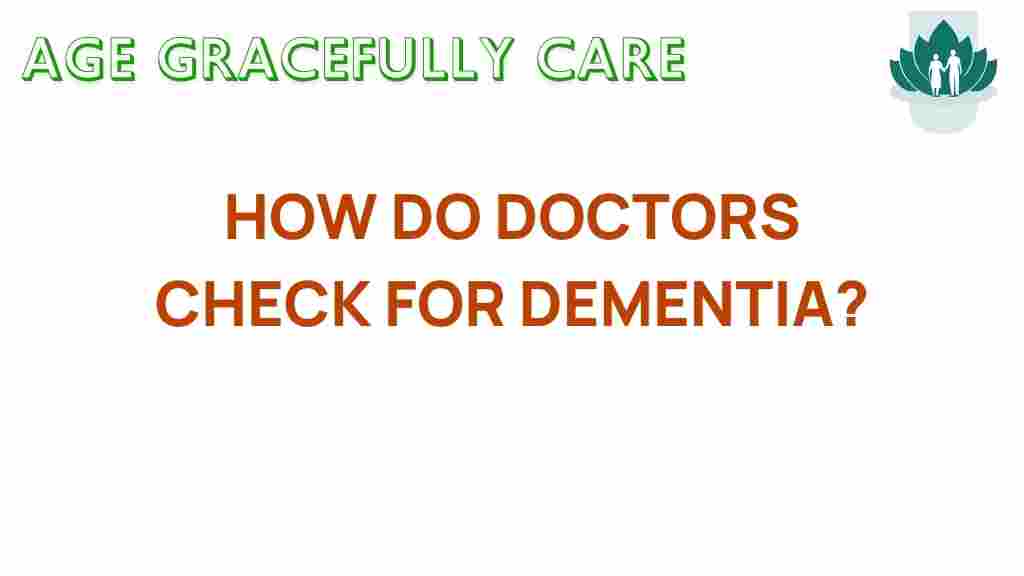Unraveling the Mystery: How Do Doctors Check for Dementia?
Dementia is a term that describes a range of symptoms affecting memory, thinking, and social abilities severely enough to interfere with daily life. It is not a specific disease, but rather a syndrome that can be caused by a variety of conditions, including Alzheimer’s disease. Understanding how doctors check for dementia is crucial for early diagnosis and effective management of this complex condition. In this article, we will delve into the methods used by healthcare professionals to assess cognitive function, conduct neurological evaluations, and ultimately diagnose dementia.
Understanding Dementia and Its Symptoms
The first step in the diagnostic process is recognizing the symptoms of dementia. Common signs include:
- Memory loss, particularly forgetting recent information
- Difficulty performing familiar tasks
- Challenges with language and communication
- Disorientation to time and place
- Changes in mood and personality
These symptoms can vary widely between individuals and can be indicative of various types of dementia, including Alzheimer’s disease, vascular dementia, and Lewy body dementia. Early detection is vital in managing these symptoms and improving patient care.
The Cognitive Assessment Process
When a patient or their family expresses concern about memory and cognitive decline, the healthcare process typically begins with a cognitive assessment. This assessment helps in determining the severity and type of cognitive impairment. Here’s how doctors generally carry out this evaluation:
- Initial Consultation: The doctor will conduct a comprehensive interview with the patient and their family to understand the concerns, history of symptoms, and any changes in behavior.
- Medical History Review: A thorough review of the patient’s medical history, including medication usage, previous illnesses, and family history of dementia or other mental health conditions.
- Physical Examination: A general physical examination to rule out other health issues that might affect cognitive function.
Memory Tests: What to Expect
One of the key components of a cognitive assessment is the memory test. During this phase, the doctor will evaluate the patient’s memory and cognitive abilities through various standardized tests. These can include:
- Mini-Mental State Examination (MMSE): A widely used test that assesses various cognitive functions, including arithmetic, memory, and orientation.
- Montreal Cognitive Assessment (MoCA): A brief screening tool that can detect mild cognitive impairment and assess multiple cognitive domains.
- Clock Drawing Test: A simple task where the patient is asked to draw a clock, which helps evaluate executive function and visual-spatial skills.
These tests provide valuable insight into the patient’s cognitive health and help in the diagnosis of dementia.
Neurological Evaluation: A Deeper Dive
If the initial cognitive assessment indicates possible dementia, the next step is a comprehensive neurological evaluation. This may involve:
- Neurological Examination: The doctor will assess reflexes, coordination, muscle strength, and sensory perception to identify any neurological issues.
- Imaging Tests: Techniques such as MRI or CT scans may be utilized to visualize brain structure and rule out other causes of cognitive decline, such as tumors or strokes.
- Blood Tests: These tests can help identify underlying conditions, such as vitamin deficiencies or thyroid problems, that may mimic dementia symptoms.
Diagnosis of Dementia
Upon completion of the cognitive assessment and neurological evaluation, healthcare professionals will analyze the data collected. Diagnosing dementia involves:
- Evaluating Test Results: Doctors combine results from memory tests, neurological evaluations, and imaging studies to assess the likelihood of dementia.
- Ruling Out Other Conditions: Ensuring that symptoms are not attributed to other medical issues is crucial for an accurate diagnosis.
- Formulating a Diagnosis: Based on the collected information, the doctor can provide a diagnosis, which may include specific types of dementia, such as Alzheimer’s disease or vascular dementia.
Addressing Concerns and Next Steps
Receiving a diagnosis of dementia can be overwhelming for patients and their families. Here are some troubleshooting tips to consider:
- Seek Support: Connecting with support groups for dementia can provide emotional relief and practical advice.
- Explore Treatment Options: Discuss possible treatment plans, which may include medications and therapies aimed at managing symptoms.
- Plan for the Future: Consider legal and financial planning to ensure that the patient’s wishes are respected as the disease progresses.
Conclusion: The Importance of Early Detection
Dementia is a complex syndrome that impacts not only the individual but also their loved ones. Understanding how doctors check for dementia through cognitive assessments, neurological evaluations, and memory tests is essential for early diagnosis and effective management. Early detection allows for timely interventions that can improve patient care and quality of life.
For more information on mental health and dementia, you can visit this resource. If you or a loved one exhibit signs of cognitive decline, don’t hesitate to seek help from a healthcare professional.
In conclusion, navigating the journey of dementia diagnosis is challenging but crucial. By understanding the steps involved in the assessment process, families can better prepare for what lies ahead, ensuring they have the support and resources needed to face the challenges of dementia together.
This article is in the category Health and created by AgeGracefullyCare Team
